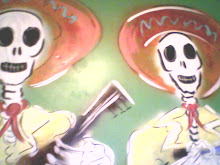evolutionary therapy: I
"Animals in order to survive have had to be protected by fear-responses, in relation not only to other animals but to nature itself. They had to see the real relationship of their limited powers to the dangerous world in which they were immersed. Reality and fear go together naturally. As the human infant is in an even more exposed and helpless situation, it is foolish to think the fear response would have disappeared in such a weak and highly sensitive species. It is more reasonable to think that it was instead heightened, as some of the early Darwinians thought: early men who were most afraid were those who were most realistic about their situation in nature, and they passed on to their offspring a realism that had a high survival value."
--Ernest Becker, The Denial of Death
--Ernest Becker, The Denial of Death
Yes, they did indeed pass on to their offspring a realism (that is, the fear response, which I'm gonna call the death urge because this is supposed to be a horror movie blog, after all), and since the men who developed this sense of anxiety about the world would have lived longer than those without it, he would have produced more and more offspring. The death urge would have been naturally selected for and passed on to future generations via genetic information.
Becker concludes thusly: "The result was the emergence of man as we know him: a hyperanxious animal who constantly invents reasons for anxiety even where there are none." I said something very similiar to a very pretty young girl while we sat on the floor on Valentine's Day, but in Becker's quote, I believe that I have found the crux of the idea that I have felt germinating inside me for the past couple of years. I have wanted to be a therapist, but it is becoming increasingly harder for me to reconcile the reality of how most of the people in the mental health field think. They are not scientifically inclined, and it has hurt the development of empirical data to back up most of the claims that the field makes about how it rehabilitates people. There is always a push to legitimize the social sciences, but mental health has been lagging, lagging due to generations of scholars perpetuating Freudian non-sense, hypnotherapy, Christian-based counseling, and the like.
But here, it seems, lies the roots of the idea that I am calling evolutionary therapy. This could become my life's work, I think, and it's based upon a simple premise. All mental disorders (calling them mental illnesses is a misnomer) are rooted in the fear of death, a very real, biological sense of mortality which is unique to humans. The death urge has helped humans to increase their numbers and ensure the ongoing survival of the species, but it has also rooted in us an innate, genetic anxiety. Therapy can help to alleviate this anxiety, but first it must take aim at the ways that humans have naturally selected for the death urge, and the ways that we can healthily deal with it. This involves educating people on biology and the evolutionary roots, of their fears, depressions, anxieties, and psychotic behaviors which have been misunderstood and allowed to take control over their lives. Humans need science and evolutionary theory in order to ensure the continuation of the species. I do not know if this is a new theory, but there has never been a scholarly article written which utilizes the term 'evolutionary therapy'. This may not be new, and it may not even be novel, but it is a beginning of my academic pursuits and, I hope, will offer an alternative to the soft, touchy-feeliness which therapy is often associated. Like the films that I will make because they are the types of movies that I want to see, I am going to develop a new model of social work practice, because I cannot exist and work with the existing one.
But here, it seems, lies the roots of the idea that I am calling evolutionary therapy. This could become my life's work, I think, and it's based upon a simple premise. All mental disorders (calling them mental illnesses is a misnomer) are rooted in the fear of death, a very real, biological sense of mortality which is unique to humans. The death urge has helped humans to increase their numbers and ensure the ongoing survival of the species, but it has also rooted in us an innate, genetic anxiety. Therapy can help to alleviate this anxiety, but first it must take aim at the ways that humans have naturally selected for the death urge, and the ways that we can healthily deal with it. This involves educating people on biology and the evolutionary roots, of their fears, depressions, anxieties, and psychotic behaviors which have been misunderstood and allowed to take control over their lives. Humans need science and evolutionary theory in order to ensure the continuation of the species. I do not know if this is a new theory, but there has never been a scholarly article written which utilizes the term 'evolutionary therapy'. This may not be new, and it may not even be novel, but it is a beginning of my academic pursuits and, I hope, will offer an alternative to the soft, touchy-feeliness which therapy is often associated. Like the films that I will make because they are the types of movies that I want to see, I am going to develop a new model of social work practice, because I cannot exist and work with the existing one.

